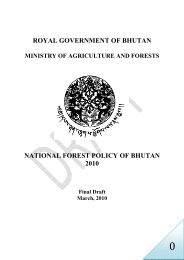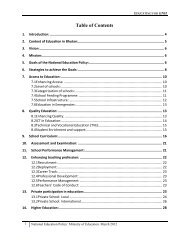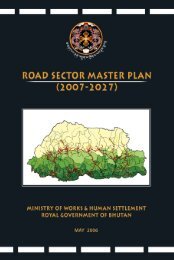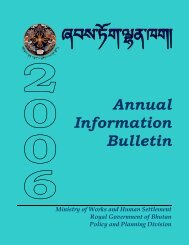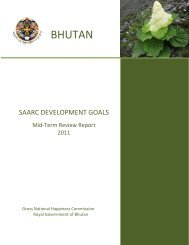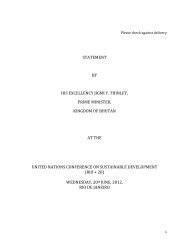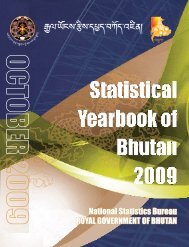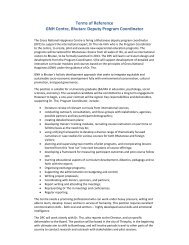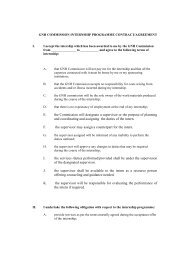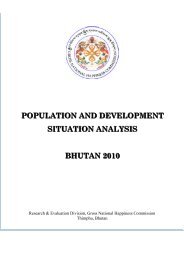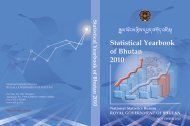COUNTRY BACKGROUND - Gross National Happiness Commission
COUNTRY BACKGROUND - Gross National Happiness Commission
COUNTRY BACKGROUND - Gross National Happiness Commission
Create successful ePaper yourself
Turn your PDF publications into a flip-book with our unique Google optimized e-Paper software.
Aid Policy<br />
9.9 Sectoral Allocation of Third Country Aid Aid allocations have reflected national development priorities. The<br />
largest shares of technical assistance have tended to be provided to the following areas, in descending order:<br />
Human Resource Development, Agriculture and Forestry, Health and Population, and Development<br />
Administration. Industry and Transport and Communications, which take only a small share of technical<br />
assistance, have received a greater proportion of capital assistance, of which Agriculture and Forestry have received<br />
the largest share.<br />
III. Aid Policy for the 7FYPIII. Aid Policy for the 7FYP<br />
Basic PrinciplesBasic Principles<br />
Figure 9.3<br />
9.10 The Royal Government welcomes aid from the international community. <strong>National</strong> development objectives<br />
will not be readily achieved without external funding and technical expertise. In Bhutan's case, the low level of<br />
monetisation of the economy and the limited tax base have made it more difficult to mobilise internal resources. As<br />
explained in the Chapter on Approach to Development, one of the main strategies to is to increase self reliance,<br />
which will mean increasing internal resource mobilisation and reducing dependence on aid. However, to raise<br />
adequate revenues to become completely self sufficient will not be possible within the 7FYP period and thus<br />
Bhutan will continue to seek assistance from her international partners.<br />
9.11 Continuing aid to Bhutan is justified by Bhutan's status as a Least Developed Country. In addition the low<br />
levels of health and education indicators combined with the physical constraints, described in Chapter 2, provide<br />
further reason for Bhutan to seek aid. However the Royal Government recognises that there are dangers as well as<br />
benefits associated with aid. Aid must complement Bhutan's own efforts and must not be a substitute for them; and<br />
the responsibility for deciding national priorities and development strategy must remain with the Royal<br />
Government.<br />
9.12 An important aspect of the strategy set out in Chapter 3 is to reduce reliance on external sources of funding<br />
and thus the Government will take the necessary steps to increase domestic resource mobilisation, including<br />
ensuring that communities continue to contribute to the costs of development activities, through provision of labour<br />
etc. The economic growth envisaged during the 7FYP, will also enable the RGOB to finance an increasing<br />
proportion of expenditures from domestic revenues. At the same time, the RGOB is determined to be prudent in its<br />
development expenditures and to keep its borrowing comfortably within its capacity to service debt.<br />
3



